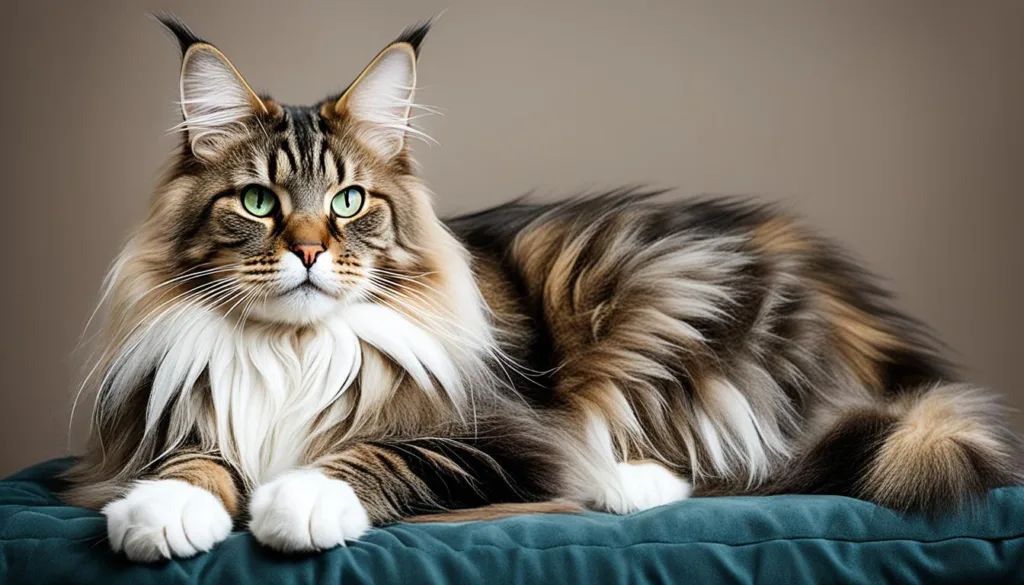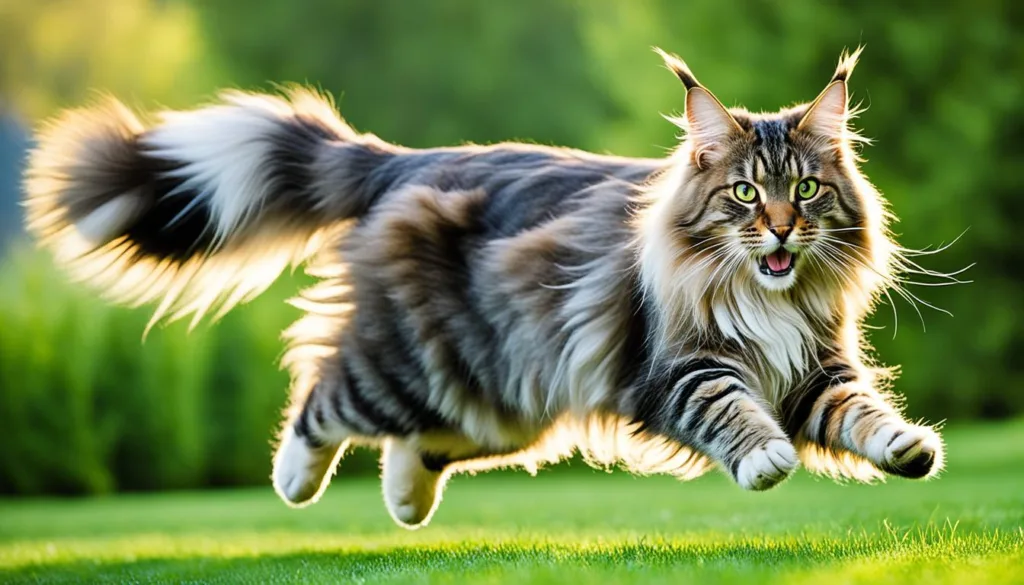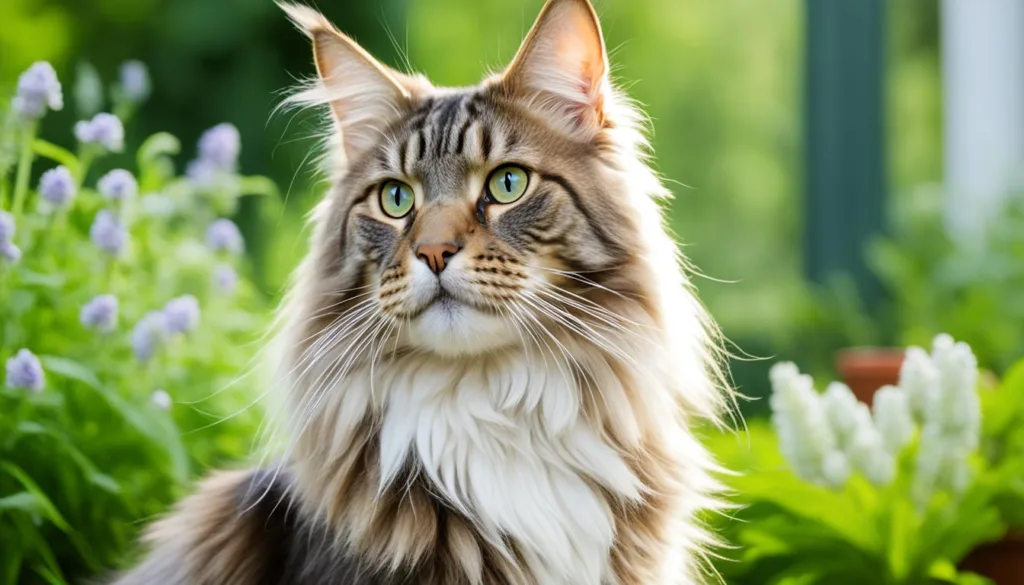Maine Coons are big, friendly, and majestic cats known for their unique looks and gentle nature. They are also prone to certain genetic disorders. This guide will cover the most common Maine Coon genetic conditions. We’ll talk about spinal muscular atrophy (SMA), hypertrophic cardiomyopathy (HCM), hip dysplasia, stomatitis, and polycystic kidney disease (PKD).
We’ll share insights on the causes, symptoms, and how to prevent and treat these conditions. This will help Maine Coon owners keep their cats healthy and happy for a long time.
Key Takeaways
- Maine Coon cats are prone to various genetic disorders, including SMA, HCM, hip dysplasia, stomatitis, and PKD.
- Early detection and preventive measures are crucial to managing these health conditions in Maine Coons.
- Responsible breeding practices, genetic testing, and regular veterinary care are essential for maintaining the overall health of Maine Coon cats.
- Proper nutrition, exercise, and environmental enrichment can help reduce the risk of obesity and other weight-related issues in Maine Coons.
- Staying informed about the unique health needs of Maine Coons can help owners provide the best possible care for their beloved feline companions.
Introduction
The Maine Coon is a big, fun breed known for being friendly, talkative, and loving. They have a thick, flowing coat and are quite big. These cats are loved all over the world for their gentle nature. They fit well into families, getting along with kids and other pets.
Friendly and Majestic Nature of Maine Coons
Maine Coons are known for being gentle and loving. They are smart, playful, and love to interact with people. Their big size, thick coat, and tufted ears make them look regal and majestic.
Overview of Common Genetic Disorders in the Breed
Maine Coons are usually healthy but can have genetic issues. The most common ones are SMA, HCM, hip dysplasia, stomatitis, and PKD. It’s important to know about these to keep your Maine Coon healthy.
| Genetic Disorder | Description | Impact on Maine Coons |
|---|---|---|
| Spinal Muscular Atrophy (SMA) | A recessive genetic disorder that causes muscle weakness and atrophy | Leads to an irregular gait and muscle weakness in affected Maine Coons |
| Hypertrophic Cardiomyopathy (HCM) | A common heart disease that causes the heart muscle to thicken | Can lead to lethargy, irregular heartbeat, and potentially heart failure in Maine Coons |
| Hip Dysplasia | A genetic condition that causes the hip joint to develop abnormally | Leads to pain, lameness, and arthritis in large breed cats like Maine Coons |
| Stomatitis | A chronic inflammatory condition affecting the mouth and gums | Causes painful oral inflammation and can lead to heart and kidney problems in Maine Coons |
| Polycystic Kidney Disease (PKD) | An inherited disorder that causes cysts to form in the kidneys | Can result in kidney failure and other symptoms like weight loss and loss of appetite in Maine Coons |
Knowing about these genetic conditions is key to keeping Maine Coons healthy. Regular vet visits, genetic tests, and careful breeding help a lot. These steps are important for the health of these wonderful cats.
Spinal Muscular Atrophy (SMA)
Spinal muscular atrophy (SMA) is a genetic condition that affects the neurons in a Maine Coon’s spine. This leads to an awkward gait and abnormal posture. Kittens inherit this from both parents and show signs within 3 to 4 months after birth.
Causes and Symptoms of SMA
SMA causes loss of muscle mass in the hindquarters and postural abnormalities. It also makes jumping difficult and causes muscle instability and weakness. This condition is inherited as an autosomal recessive trait, caused by a large deletion on chromosome 1.
Caring for a Maine Coon with SMA
There is no cure for SMA, but cats can live long and healthy lives with proper care. Keep them indoors to prevent injuries. Make sure their food, water, and favorite spots are easy to reach to avoid jumping. This way, Maine Coons with SMA can have a good life.
A DNA test can check if a Maine Coon cat has SMA alleles from its parents. Breeders can spot early signs of SMA in cats around 4 months old. If two carriers mate, 25% of their kittens may have SMA.
To care for Maine Coons with SMA, keep them indoors and make sure they can easily get to their food and water. Muscle weakness in the hind legs might not always be SMA. Always get a vet’s diagnosis.
Hypertrophic Cardiomyopathy (HCM)
Hypertrophic cardiomyopathy (HCM) is a common heart disease in cats, especially in Maine Coons. It makes the heart walls thick, which can stop the heart from pumping well. This can lead to heart failure and sudden death. Researchers have found a gene linked to HCM, but one study found that one-third of tested cats still got the disease.
Understanding HCM in Maine Coons
HCM is the most common heart disease in cats, and Maine Coons are more likely to get it. It makes the heart’s left ventricle walls thick, reducing blood flow. Cats with HCM might not seem sick, but they could die suddenly, though this is rare.
Diagnosis and Treatment Options
To diagnose HCM, vets use echocardiography to see the thickened heart walls. Genetic tests can show if a cat is at higher risk. There’s no cure, but treatment helps control the heart rate and prevent lung congestion. Cats may get medicines like Clopidogrel, Diltiazem, or Furosemide. Supplements with ubiquinol, taurine, and omega-3 fatty acids can also help.
| Breed | Incidence of HCM |
|---|---|
| Maine Coon | Higher risk |
| Ragdoll | Higher risk |
| British Shorthair | Higher risk |
| Sphynx | Higher risk |
| Chartreux | Higher risk |
| Persian | Higher risk |
There’s no cure for HCM, but cats can live with it. Mild cases can last years, but severe ones might only last six months. Early detection and proper care can improve a cat’s life with HCM.

Hip Dysplasia
Hip dysplasia is a common issue in Maine Coon cats. It happens when the hip joint doesn’t fully cover the ball part of the thighbone. This leads to the hip bone moving out of place. About 20% of Maine Coons might get this condition.
Early signs include joint looseness, pain, and trouble jumping or climbing. Cats may also have a hard time getting up, make grating sounds when moving, and walk with a sway.
Signs and Risk Factors of Hip Dysplasia
Hip dysplasia is less common in cats than in dogs and humans. But, it’s more common in certain breeds like Maine Coons. Being overweight adds stress to the joints, making it worse.
Signs include limping, avoiding activity, and pain when touched near the hip. Cats might also lick or chew the hip area a lot.
Management and Preventive Measures
Vets use X-rays to diagnose hip dysplasia in cats. Treatment can be pain meds or surgery, like joint replacement. New treatments like stem cell therapy and acupuncture can also help.
Keeping your cat at a healthy weight is key. Too much weight makes the pain worse.
Over time, selective breeding has made Maine Coon cats less likely to have severe hip dysplasia. Males are more at risk than females because they’re bigger. Having it in both hips is usually worse than just one.
Managing hip dysplasia in cats means controlling their weight, exercising them, and giving supplements. Pain meds can help, and surgery might be needed for severe cases. With the right care, cats with hip dysplasia can do well.
Common Genetic Disorders in Maine Coons and How to Prevent Them
Maine Coons are prone to genetic disorders like stomatitis and polycystic kidney disease (PKD). Stomatitis causes mouth pain, leading to less eating, weight loss, and dental problems. PKD results in kidney failure due to kidney cysts. To prevent these issues, focus on responsible breeding, genetic tests, and early treatment.
Maine Coons face health challenges due to their genes, say experts. These include:
- Spinal Muscular Atrophy (SMA): A recessive gene that causes kittens to show signs within 3 to 4 months of birth.
- Hypertrophic Cardiomyopathy (HCM): Affects approximately 1/3 of cats undergoing genetic testing, with diagnosis recommended around 6 years of age.
- Hip Dysplasia: Affects around 20% of Maine Coon cats, resulting in dislocation of the hip bone.
Early detection and management are key for Maine Coon health. Regular vet visits, genetic tests, and advice from responsible breeders can help. This approach prevents and reduces the effects of these genetic disorders.
| Genetic Disorder | Prevalence | Key Symptoms | Diagnosis and Management |
|---|---|---|---|
| Stomatitis | Common | Mouth ulcers, loss of appetite, weight loss, dental issues | Physical exam, dental X-rays; treatment may include medication, dental cleaning, or tooth extraction |
| Polycystic Kidney Disease (PKD) | Prevalent | Weight loss, increased thirst, lethargy, vomiting | DNA testing, abdominal ultrasound in cats over 7 years old; management through dietary changes and medication |
Being informed and working with reputable breeders helps Maine Coon owners. They can ensure their pets’ long-term health and happiness.
Stomatitis
Stomatitis is a common health issue for Maine Coons. It causes painful mouth sores and swelling, making eating hard for the cat. Signs include not wanting to eat, losing weight, bad breath, and acting differently around their mouth.
Causes and Symptoms of Stomatitis
Doctors diagnose stomatitis with exams, dental X-rays, and blood tests. Things like FIV, FeLV, and genetics can make a cat more likely to get it. If it doesn’t go away, removing teeth might be needed to ease pain.
Natural Remedies and Treatment Approaches
Natural ways like cold laser therapy and feeding raw can help with stomatitis. Supplements and dental products with the VOHC Seal also help. These methods can make periodontal disease less severe in cats.
Stomatitis is a big problem for many Maine Coons. But, by knowing what causes it and trying natural treatments, owners can ease their cat’s pain. This helps keep their mouths healthy and comfy.
Polycystic Kidney Disease (PKD)
Polycystic kidney disease (PKD) is a hereditary condition that affects Maine Coons. Fluid-filled cysts grow on the kidneys, disrupting their function and leading to kidney failure. These cysts develop slowly, often not showing up until a Maine Coon is seven years old. Cats only need one parent with the gene to get PKD.
Understanding PKD in Maine Coons
PKD is caused by a single gene abnormality. Both male and female Maine Coons can be affected. Cats with PKD pass the gene to their kittens, even if they’re not paired with an affected cat. Some cats with PKD don’t have the known PKD gene mutation, suggesting other genetic factors might be at play.
Diagnosis and Management Strategies
Routine blood work and urinalysis can hint at kidney issues in Maine Coons. An abdominal ultrasound is needed to confirm PKD. Symptoms include weight loss, increased thirst, lethargy, loss of appetite, vomiting, and frequent urination.
Treatments for PKD aim to manage kidney failure symptoms. This includes antibiotics, anti-inflammatory drugs, pain relief, appetite boosters, fluid therapy, and diet changes. A kidney-friendly diet is crucial. Natural therapies like B-vitamins, phosphorus binders, amino acids, and herbs can also help.
“PKD1 is inherited as an autosomal dominant condition, requiring only one copy of the altered gene to produce the disease.”
Since PKD is hereditary, genetic testing can check if a Maine Coon has the condition. This info is key for responsible breeding to lower PKD in the breed.
Responsible Breeding Practices
It’s crucial to breed Maine Coons responsibly to prevent genetic disorders. Breeders must test all breeding cats for conditions like HCM, PKD, and SMA. This helps them make smart choices and stop harmful genes from spreading.
The Role of Genetic Testing
Good Maine Coon breeders focus on their cats’ health and well-being. They use genetic tests and pick breeding pairs wisely. This way, they help ensure Maine Coon owners get a healthy cat.
- Breeders work with vets and labs to test cats’ DNA.
- Tests involve cheek swabs or blood samples to check for HCM, PKD, and SMA.
- The goal is to breed healthy kittens by testing for genetic disorders.
Reputable Breeders and Their Significance
Responsible Maine Coon breeders focus on keeping the breed healthy. They offer health insurance and a good start for kittens. This helps reduce the risk of passing on diseases.
“Responsible breeders collaborate with veterinary professionals and specialized laboratories to perform genetic tests by analyzing DNA samples from breeding cats.”
Choosing reputable breeders who focus on genetic testing and responsible breeding increases your chances of getting a healthy Maine Coon.
Nutrition and Lifestyle Considerations
For Maine Coons, a balanced, high-quality diet is key, especially when dealing with genetic disorders. A diet low in sodium but rich in amino acids and fatty acids can aid cats with HCM. This diet also helps those with kidney disease or stomatitis.
Importance of a Balanced Diet
A balanced diet is vital for Maine Coons. Cats with HCM benefit from a low-sodium diet full of amino acids and fatty acids. These nutrients support their heart health. It’s also important to keep them well-hydrated, especially if they have kidney or stomatitis issues.
Exercise and Environmental Enrichment
Exercise and enrichment are key for Maine Coons. They prevent or manage genetic conditions. Activities like playtime and puzzle feeders keep their muscles and joints strong. This is great for those with hip dysplasia or SMA.
Creating a stimulating indoor space is also crucial. It helps reduce the impact of genetic disorders. This ensures a better life for your Maine Coon.

By focusing on a balanced diet and regular exercise, Maine Coon owners can help their pets stay healthy. This approach is especially important for managing genetic conditions.
Conclusion
Maine Coons are loved for their friendly and majestic nature. They also have unique looks. But, they can face health issues due to their breed. Owners can help by knowing about common health problems and how to manage them.
Things like responsible breeding, genetic tests, a good diet, and a safe home are key. Regular vet visits, proper grooming, and quick action are also important. These steps help keep Maine Coons healthy and happy.
Maine Coons need special care to thrive. By understanding their health needs and acting early, owners can help them live long, happy lives.
FAQ
What are the most common genetic disorders in Maine Coons?
How is spinal muscular atrophy (SMA) in Maine Coons caused and managed?
What is hypertrophic cardiomyopathy (HCM) in Maine Coons and how is it diagnosed and treated?
How prevalent is hip dysplasia in Maine Coons, and what can be done to manage it?
What is stomatitis in Maine Coons and how can it be managed?
How does polycystic kidney disease (PKD) affect Maine Coons, and how can it be diagnosed and managed?
How can responsible breeding practices help prevent genetic disorders in Maine Coons?
What dietary and lifestyle considerations are important for maintaining the health of Maine Coons with genetic disorders?
Source Links
- https://www.webmd.com/pets/cats/what-to-know-about-maine-coon-cats
- https://www.catster.com/cat-health-care/maine-coon-cat-health-problems/
- https://untamed.com/blogs/cat-breeds/maine-coon-health-problems
- https://www.pawpurrfect.co/finding-out-about-maine-coon-cat-health-issues/
- https://vgl.ucdavis.edu/test/maine-coon-sma
- https://mainecoon.org/the-maine-coon-and-spinal-atrophy/
- https://www.vet.cornell.edu/departments-centers-and-institutes/cornell-feline-health-center/health-information/feline-health-topics/hypertrophic-cardiomyopathy
- https://www.petmd.com/cat/conditions/cardiovascular/feline-hypertrophic-cardiomyopathy-hcm-cats
- https://www.vet.cornell.edu/departments-centers-and-institutes/cornell-feline-health-center/health-information/feline-health-topics/hip-dysplasia
- https://www.catster.com/cat-health-care/maine-coons-and-hip-dysplasia/
- https://drjudymorgan.com/blogs/blog/five-genetic-diseases-of-maine-coon-cats?srsltid=AfmBOoq5j65BN5MH9tVGe1JgTN2nceM3R7EIQPkn8u1a1LU6juiguc9h
- https://parkwoodanimalhospital.com/client-resources/breed-info/maine-coon/
- https://www.ufaw.org.uk/cats/maine-coon-hypertrophic-cardiomyopathy
- https://drjudymorgan.com/blogs/blog/five-genetic-diseases-of-maine-coon-cats?srsltid=AfmBOoob_SVbH1xQkVJ3Ez2EZD9s7SsdFBQ6jMt-Q2IiWBSJmXUJhgPB
- https://sassykoonz.com/how-to-care-for-maine-coon-teeth/
- https://atascazooanimalhospital.com/client-resources/breed-info/maine-coon/
- https://vgl.ucdavis.edu/test/pkd1-cat
- https://www.ncbi.nlm.nih.gov/pmc/articles/PMC8625840/
- https://vcahospitals.com/know-your-pet/kidney-disease-polycystic-kidney-disease-in-cats
- https://www.akcchf.org/educational-resources/library/articles/responsible-breeding-and.html
- https://thewildrendezvous.com/en/breeding-maine-coon-cats/
- https://www.palicocoons.com/post/delving-deeper-a-comprehensive-look-at-common-health-concerns-in-maine-coons
- https://www.petplan.co.uk/pet-information/cat/breed/maine-coon/
- https://www.orchardroadanimalhospital.com/services/cats/breeds/maine-coon
- https://www.tamaracvet.com/services/cats/breeds/maine-coon
- https://www.mavyn.com/blog/caring-for-your-maine-coon-health-needs-guide
- https://www.katdootje.nl/maine-coon-cat/maine-coon-cats-a-comprehensive-guide/?lang=en

